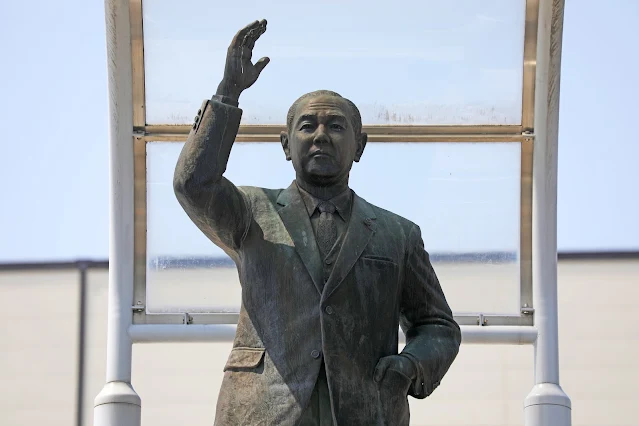
Kakuei Tanaka was a prominent Japanese politician who left an indelible mark on the country's political landscape.
Throughout his career, he held various high-ranking positions, including Prime Minister, Minister of Finance, and President of the Liberal Democratic Party.
Tanaka's influence extended beyond politics, as he played a significant role in shaping Japan's economic growth during the post-war era.
In this article, we will delve into the life, achievements, and controversies surrounding Kakuei Tanaka, exploring his lasting impact on Japanese society.
{tocify} $title={Table of Contents}
Early Life and Education
Born on May 4, 1918, in the village of Futada, now part of Kashiwazaki City in Niigata Prefecture, Kakuei Tanaka grew up in a humble farming community.
Tanaka's early life was marked by hardship, as he experienced the challenges of rural life during a time of economic instability.
Despite these circumstances, Tanaka displayed ambition and determination from a young age.
Tanaka received his education at the ordinary high school elementary school, where he completed his primary education.
His pursuit of knowledge continued at the Night School of the Chuo Institute of Technology, where he studied civil engineering.
Early Career and Entry into Politics
After completing his education, Tanaka embarked on a career in business.
He joined the Tanaka Construction Company, eventually rising to the position of President.
His success in the business world laid the foundation for his entry into politics.
In 1947, Tanaka ran for office and was elected as a member of the House of Representatives, representing the former Niigata 3rd District.
This marked the beginning of his political career, which would span over four decades.
Tanaka's early years in politics were marked by his affiliation with various political parties, including the Japan Progressive Party, the Democratic Party, and the Democratic Liberal Party.
Rise to Prominence
Tanaka's ascent to prominence within the political arena began in the late 1950s.
In 1957, he was appointed as the Minister of Posts and Telecommunications in the First Kishi Cabinet.
This marked his first ministerial position and provided a platform for him to showcase his leadership abilities.
Tanaka's political career reached new heights in 1962 when he was appointed as the Minister of Finance in the Second Ikeda Cabinet.
His tenure as Minister of Finance was characterized by his commitment to economic development and fiscal policies aimed at stimulating growth.
Tanaka's efforts were instrumental in Japan's economic transformation, playing a significant role in the country's post-war recovery.
Prime Minister and Political Reforms
In 1972, Kakuei Tanaka assumed the role of Prime Minister, serving as the 64th and 65th Prime Minister of Japan.
His time in office was marked by a series of political reforms aimed at strengthening Japan's democracy and improving government efficiency.
Tanaka's administration introduced significant changes, including the decentralization of power to local governments, reform of the electoral system, and the establishment of a new administrative structure.
One of the most notable accomplishments of Tanaka's administration was the normalization of diplomatic relations between Japan and China.
In 1972, he made a historic visit to China, meeting with Chinese Premier Zhou Enlai and laying the groundwork for future diplomatic cooperation between the two countries.
Economic Policies and Industrial Development
Tanaka's tenure as Prime Minister coincided with a period of rapid economic growth in Japan.
His government implemented a series of economic policies aimed at promoting industrial development and fostering international trade.
Tanaka's focus on economic growth led to the expansion of Japan's manufacturing sector, increased exports, and the strengthening of the country's global economic position.
During his time in office, Tanaka initiated the "Japanese archipelago remodeling theory," which aimed to develop key industries and promote technological innovation.
This plan played a crucial role in shaping Japan's economic landscape, paving the way for the country's emergence as a global economic powerhouse.
Controversies and Legacy
Despite his significant contributions to Japan's development, Kakuei Tanaka's political career was marred by controversies.
In 1976, he was implicated in a political scandal involving the Lockheed Corporation, a major American aerospace and defense company.
Tanaka was accused of receiving bribes in exchange for favoring Lockheed in government contracts.
The scandal tarnished his reputation and led to his resignation from the Liberal Democratic Party.
Tanaka's legacy is a complex one.
While his political career ended in controversy, his contributions to Japan's economic growth and industrial development cannot be overlooked.
His leadership and vision played a pivotal role in shaping modern Japan, leaving a lasting impact on the country's political and economic landscape.
Later Years and Personal Life
Following his resignation from the Liberal Democratic Party, Tanaka continued to be involved in politics as an independent politician.
He remained an influential figure within the political sphere, albeit from a less prominent position.
In his later years, Tanaka devoted himself to philanthropy and charitable activities, engaging in efforts to support education and rural development.
Kakuei Tanaka's personal life was marked by tragedy and success.
He was married to Hana Tanaka and had three children.
His eldest son, Shōhō, tragically died at a young age.
His daughter, Makiko, pursued a career in politics, becoming a prominent figure in her own right.
Tanaka's second son, Kyo, established himself as a renowned music critic.
Conclusion
Kakuei Tanaka's political career and legacy are a testament to his determination, leadership, and impact on Japanese society.
Despite the controversies surrounding his name, Tanaka's contributions to Japan's economic growth and political reforms cannot be overlooked.
His vision and policies helped shape Japan into the economic powerhouse it is today.
While his personal life faced its share of challenges, his dedication to public service and commitment to the betterment of his country leave a lasting legacy in the annals of Japanese history.

Post a Comment